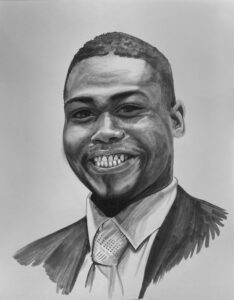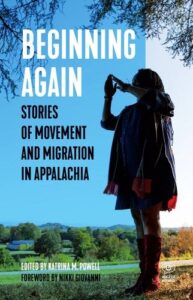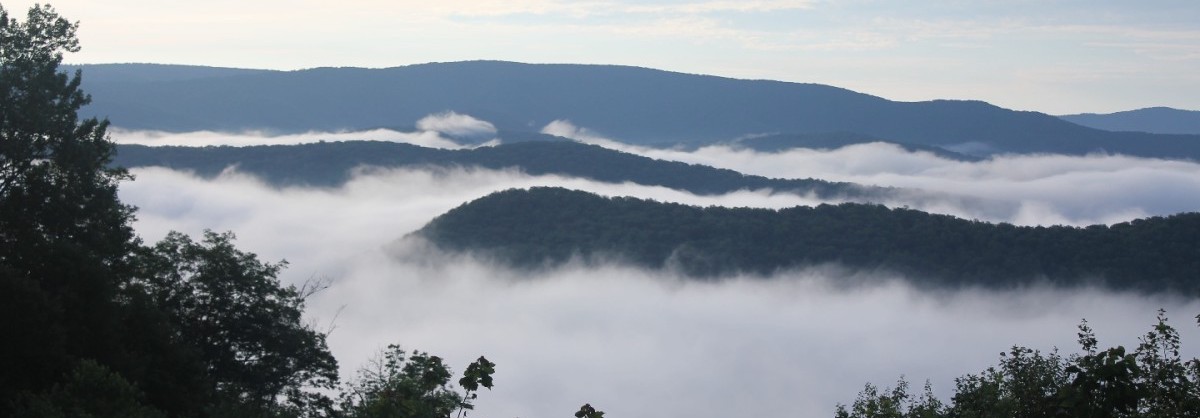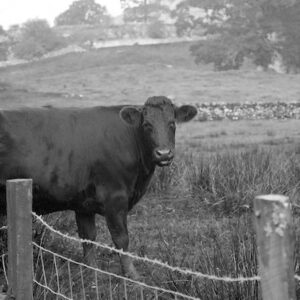
Mekyah (pronounced meh-kai-yah) Davis lives in a small town in the southwest mountains of Virginia near the Tennessee and Kentucky borders. His love of Appalachia and his family’s place in the region is reflected in his reverence for the landscape and his dedication to his work. He is the co-coordinator of Black Appalachian Young & Rising (BAYR, pronounced “bear”), an initiative of the STAY Project, a grassroots effort whose mission is to make their communities places for Appalachian youth to stay. Mekyah’s commitment to STAY is fueled by his desire to live in Appalachia, but, like many young people, he finds decent employment opportunities scarce.
Mekyah spoke of his childhood with affection, describing his family and living in the mountains in detail. In speaking about his friends who moved away to find work, he mentioned that some people assumed he wouldn’t want to stay in Big Stone Gap. He gestured toward the mountains behind his house, and asked, “Who wouldn’t want to live here?”
*
I went to Powell Valley High School until it was consolidated with Appalachia High School during my sophomore year. Like in a lot of communities in Appalachia, Powell Valley’s high school building was old and needed repair. There wasn’t enough money to build a new one, so they merged the two high schools to save money. It was a huge change for our community and meant a longer drive for many students.
My mom grew up here. The Mitchell family actually goes back eight generations here in Big Stone Gap. Some of my aunts and uncles relocated to Maryland, Detroit, and Atlanta, but my mom stayed here. My dad is from Birmingham, Alabama, and they met during their first year at Berea College, in Kentucky. When they got married, they came back here.
I think it was a lot for my dad, moving to a place like this, after being at a college that was focused on social justice and in an atmosphere that was welcoming. My mom’s family is here, but in Birmingham my dad grew up around a lot more Black folks. He never did like it in Big Stone Gap. It was a culture shock to him living in a town of mostly white people. The town of Appalachia, Virginia, where Appalachia High School was originally located, is about five miles from the town of Big Stone Gap, but the route to get there is over the Cumberland Mountain range.
When Wallens Ridge State Prison opened, my dad got a job there, but he was one of fewer than twenty Black prison guards. The corrections officers were known to be awful to the prisoners, and my dad couldn’t do much about it as a Black person. It’s not something he talked about much, but prisoners were beaten, and it was not good. It was a struggle for him, being a young Black man working in a prison where Black folks were behind bars, and he was the only one outside.
*
I have really fond memories of being a little kid in Big Stone Gap. We lived near my grandmother, and we played outside all the time. My parents were eighteen when they had my twin brother and me. They were both encouraging and loving. I had several friends and we played football together. I met my best friend Cameron playing football. Cameron, my friend Fonseca, and my brother Noah were always together and having fun. My family talked about race at home, in the sense of being aware of what it is to be a Black person in this country, but we didn’t talk about it a lot. We didn’t talk about police brutality; it was more about navigating the world around us. Whenever we would run around with friends, my parents would say to us, “Y’all ain’t your little white friends.” They meant we had to watch the way we would interact with authority figures, like our teachers or the police.
At home we had a good time. My dad loved music, so there was always music playing, like Outkast, Kanye West, older John Legend. The Get Lifted album is seared into my brain. My dad took us fishing a lot too. Noah liked to fish sometimes, too, but fishing was how me and my dad bonded—it was our thing. We also watched sports together. He was an avid fan of the Lakers and the Cowboys. I liked Notre Dame. He played video games with me and my brother.
He really likes to cook, too, so we’d have wings and chili while watching football. He’s a great cook, though he uses lots of garlic. He makes these great drumsticks with pepper and garlic—a recipe I’ve been trying to replicate lately. When he made chili beans, he burnt the bottom of the beans, just a little bit, making a really delicious and unique chili. Once, when I was seven, he made us lamb. He put it in front of us and we asked what it was, and he said, “Just eat it.” We said it was good. And then he told us it was lamb, and we were mortified. But it was funny too. There was a lot of laughter during those days.
We really didn’t see him much, though. He mostly worked the night shift at the prison. Every once in a while, he would come home during what was his lunch break, but it would be midnight. If I was up too late, I would see him during those times, wearing his black, black boots and his dark navy correctional officer uniform. There was a little yellow patch on the shoulder with a state of Virginia emblem with the state flag on it. He also had a big black belt that held a metal chain, a bunch of gadgets, and his gun. He and my mom would sit at the table while he ate. He also wore his National Guard uniform when he went over to Mooresville, North Carolina, for training once a month. So we were used to seeing him in a uniform.
He was thoughtful and quiet, really intelligent. He didn’t really express any emotions. So when he had to leave for Iraq in 2002, we didn’t really know what to think, he just said he had to go. The lead-up to him leaving all seemed mundane. There were other guys in our community going, too, and everybody acted like it was normal. Mr. Renfro, who was later my fifth-grade math teacher, went to Iraq too.
I was obsessed with my dad’s Desert Storm uniform. It was different than his regular army uniform. The desert sand uniforms have browns and grays instead of dark greens and black. And he had different boots—light brown, not black. My brother and I watched him trying it on and packing it. He left his normal army uniform here when he got called up. It hung on the inside of the closet door in my mom’s room while he was deployed.
When it was time for him to go, we all took him to Fort Eustis near Newport News. My mom, Noah, and my baby sister, Tierra, all went to take him there. It was a big trip and we all just stood there, mom holding the baby in one arm, holding my brother’s hand with the other. We hugged, but it wasn’t emotional, not there. Once we got in the car to leave, we all cried. My mom got a speeding ticket, and the cop didn’t know what to think with all of us crying.
Noah and I were seven and Tierra was three, so it was a lot of chaos during that time while my dad was away, and Mom was taking care of us alone. I got into football, Noah got into music, and Mom took care of the baby.
*
I remember being super happy when we knew he was coming home two years later. He kept mixing up me and Noah. He couldn’t tell us apart for a while when he first got home. It makes sense because everything was chaotic—he was adjusting to being back. In terms of work, there wasn’t anything for him, no other job but the prison.
When he got back from Iraq, he didn’t talk anything about the war. My mom told me later that there was a meeting for spouses that she and other people went to, and the officers told them not to ask the soldiers about what they’d been through or what they’d seen. “Don’t try to force anything out of them,” they told her. There weren’t any tools for any of us, especially for my dad. He didn’t know how to navigate the trauma of the war. And in the Black community especially, taking care of our mental health is not something we talk about. Here was this brilliant, sensitive man, now not functioning— an alcoholic—and I wonder if it would have been different if there were services for him or just a way for him to talk about it. We didn’t know—we were just kids. We expected him to integrate back into life, into our family life. But it didn’t get better.
He was twenty-seven when he got back. He had to work at the prison again. But he came back changed, and there wasn’t anything for him to help him cope. The war affected him. He was gone from the time I was in second grade to fourth grade. When he came back it was really hard, and my parents fought a lot. Then, in February of my sixth-grade year, his mom—my grandmother—died. Then it got really bad. He started drinking more and he never stopped. My parents got divorced right before my ninth-grade year and then we went nine years without really seeing him. He moved to Hazlehurst, Mississippi, near where he was from in Alabama.
After my parents got divorced and he moved, I remember feeling different. I thought, Why can’t he be there? I knew he loved to watch me play football in the eighth grade, and now he wasn’t there to watch me play in high school. But you learn to not worry about it; you have to, or else it’s too hard.
Right before they got divorced, he went on his two-week National Guard trip. I knew he wasn’t coming back after that. We were getting ready to play a game—it was August, so it was really hot. Our field is down in a little valley. We were warming up, and I just so happened to look up toward the hill, and I saw him. He was in his uniform, and he was just standing there. We’d been working out so hard. I was breathing hard and sweating and the coach was calling me back, but I was so excited to see him there, looking down at us. He didn’t get to watch me play after that, but my mom was at every game.
So I played football, which kept my mind off things. I was athletic and competitive, but I was also good in school. Looking back, I think football was a means of survival and fitting in. It’s how I found my friend group. The first friend I ever made was in football. We’re still best friends. I found an identity in football, and it was how I navigated some of the hard stuff in school.
*
There were some tense moments in high school and on the football field. Nothing blatant, just constant racist jokes and threatening behavior. I just wanted to survive in high school and to fit in. I had to learn how to navigate the environment, but I wanted to stay true to myself. I was supposed to be a tough football player, but I felt like I had to put up with all that really toxic and harmful behavior because I was a young Black person. I was exposed to people who were blatantly racist, but mostly it was them telling jokes using Black stereotypes. I had to play along. It felt like we were not always allowed to react because of where we were, in the heart of Appalachia.
When I was younger, I felt that I had a Black experience of Appalachian identity and culture. My family was Black; I didn’t want to assimilate, but I felt I was Appalachian.Honestly, a lot of my favorite memories are from playing football. Friday nights were electrifying and chilling—there’s no other way to describe the atmosphere. There’s three thousand people in the stands, cheering for you and your team. There’s no other feeling like that. Despite those really hard times with my family and racist teammates, I still remember those football game nights.
It was my friends who got me through. Fonseca was one of my best friends growing up, Robert Anthony Wade Fonseca. He played football, too, and we liked to hang out and have fun. His dad was a doctor and was always gone, and his mom had some health problems, so she wasn’t super mobile. We could hang out at Fonseca’s house and do pretty much what we wanted. It was basically a party house, but it was also a refuge for us.
One night we were playing at Richlands High School, a school we play every year—big rivalry. The year before we had barely lost, so we were really wanting to beat them. It was a close game and with just seconds left we were losing by three points. On the very last play of the night, our quarterback couldn’t pass it, so he ran it himself. He almost fell, but then he ran it back for a touchdown. It was like a scene from a movie. We finally beat Richlands. Everybody cheered and jumped on top of each other to celebrate. I was at the bottom and felt like I was going to suffocate. There was this guy on my team who said something racist to me in the pile. That was typical.
But winning was so amazing. Then, as we were leaving the field, our mascot got punched in the face by someone from the other team. Then another kid got stabbed. We were happy that we won and yet scared to death. When we left on the bus, we passed a building in the middle of town that the other team set fire to. That was my childhood—these great moments with really hard moments.
When we got back, Cameron, my cousin Des, and I spent the night at Fonseca’s. We just laid in this giant bed together, replaying the game, laughing and talking loud about beating Richlands. My cousin danced around us while we bounced around on the bed. We were laughing and having a great time. The three of us—white, Black, and Brown boys—together laughing and joking around. But all this heavy stuff was around us. Shit we’d seen, knowing there wasn’t any way we could stay here after graduation even though we wanted to. We made fun of each other, we laughed at each other, but there was also tenderness in those moments.
Fonseca was really sweet and caring, looking out for us all, making sure we were all having fun. He was really sensitive. Once when we were riding the bus to a game, I’d fallen asleep but woke up hearing him sniffling. He told me he was having problems with his girlfriend. To make him feel better, I told him, “We’re going to play this game!” He laughed, and yelled, “Yeah!” but he had a faraway look in his eyes too. He was a softy, a sweet dude with a really big heart.
*
I feel the natural beauty now that it’s fall, when we go from summer to cool fall air. It’s a season of change, when the leaves turn colors and the temperature is cool, I remember those football nights. I felt free then, in a way I don’t feel now. So football is basically what got me through school. I mean, I didn’t have the terminology for it at the time, the racism in school. It wasn’t until I read The Souls of Black Folk in college that I could look at it this way. Dr. W. E. B. Du Bois uses the term double consciousness to describe the experience of being Black in America, and that was my experience growing up in Big Stone Gap. When I was younger, I felt that I had a Black experience of Appalachian identity and culture. My family was Black; I didn’t want to assimilate, but I felt I was Appalachian.
I think back on how damaging the racism was to me, to the psyche of young Black folks like me. All the harmful, internalized stuff I heard throughout the school year—it’s a lot. There were probably ten Black kids in my high school class out of 152. We didn’t know how to deal with it except to survive, go along. We couldn’t voice how we felt.
I didn’t ever feel fearful going to school, but I think that’s just because of the reputation I built for myself—I had comfort and a safety net. When I was playing sports, I was playing a violent sport, and on top of that there were people shouting racial slurs and actively trying to cause me more bodily harm at the bottom of the dogpile. So I don’t think I was fearful for my life, but, you know, it’s funny. Well, it’s not funny, actually; it’s sickening. I went to school with people I knew were racist, and they went on to become like a sheriff’s deputy in the county.
__________________________________

Excerpted from Beginning Again: Stories of Movement and Migration in Appalachia, edited by Katrina M. Powell, foreword by Nikki Giovanni. Copyright © 2024. Available from Haymarket Books.



